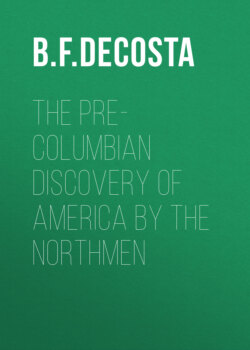Читать книгу The Pre-Columbian Discovery of America by the Northmen - B. F. DeCosta - Страница 22
На сайте Литреса книга снята с продажи.
THE DISCOVERY OF AMERICA.
ОглавлениеWe find that the Northmen were well acquainted with other parts of the world, and that they possessed all the means of reaching the continent in the west. We come, therefore, to the question: Did the Northmen actually discover and explore the coast of the country now known as America?
No one can say that the idea wears any appearance of improbability; for there is certainly nothing wonderful in the exploit. And after conceding the fact that the colonies of the Northmen existed in Greenland for at least three hundred years we must prepare ourselves for something of this kind. Indeed it is well nigh, if not altogether unreasonable, to suppose that a sea-faring people like the Northmen could live for three centuries within a short voyage of this vast continent, and never become aware of its existence. A supposition like this implies a rare credulity, and whoever is capable of believing it must be capable of believing almost anything.
But on this point we are not left to conjecture. The whole decision, in the absence of monuments like those of Greenland, turns upon a question of fact. The point is this: Do the manuscripts which describe these voyages belong to the pre-Columbian age? If so, then the Northmen are entitled to the credit of the prior discovery of America. That these manuscripts belong to the pre-Columbian age, is as capable of demonstration as the fact that the writings of Homer existed prior to the age of Christ. Before intelligent persons deny either of these points they must first succeed in blotting out numberless pages of well known history. The manuscript in which we have versions of all the Sagas relating to America is found in the celebrated Codex Flatöiensis, a work that was finished in the year 1387, or 1395 at the latest. This collection, made with great care and executed in the highest style of art, is now preserved in its integrity[56] in the archives of Copenhagen. These manuscripts were for a time supposed to be lost, but were ultimately found safely lodged in their repository in the monastery library of the island of Flatö, from whence they were transferred to Copenhagen with a large quantity of other literary material collected from various localities. If these Sagas which refer to America were interpolations, it would have early become apparent, as abundant means exist for detecting frauds; yet those who have examined the whole question do not find any evidence that invalidates their historical statements. In the absence, therefore, of respectable testimony to the contrary, we accept it as a fact that the Sagas relating to America are the productions of the men who gave them in their present form nearly, if not quite, an entire century before the age of Columbus.
It might also be argued, if it were at all necessary, that, if these Sagas were post-Columbian compositions drawn up by Icelanders who were jealous of the fame of the Geneose navigator, we should certainly be able to point out something either in their structure, bearing, or style by which it would be indicated. Yet such is not the case. These writings reveal no anxiety to show the connection of the Northmen with the great land lying at the west. The authors do not see anything at all remarkable or meritorious in the explorations, which were conducted simply for the purpose of gain. Those marks which would certainly have been impressed by a more modern writer forging a historical composition designed to show an occupation of the country before the time of Columbus, are wholly wanting. There is no special pleading or rivalry, and no desire to show prior and superior knowledge of the country to which the navigators had from time to time sailed. We only discover a straightforward, honest endeavor to tell the story of certain men's lives. This is done in a simple, artless way, and with every indication of a desire to mete out even handed justice to all. And candid readers who come to the subject with minds free from prejudice, will be powerfully impressed with the belief that they are reading authentic histories written by honest men.[57]
